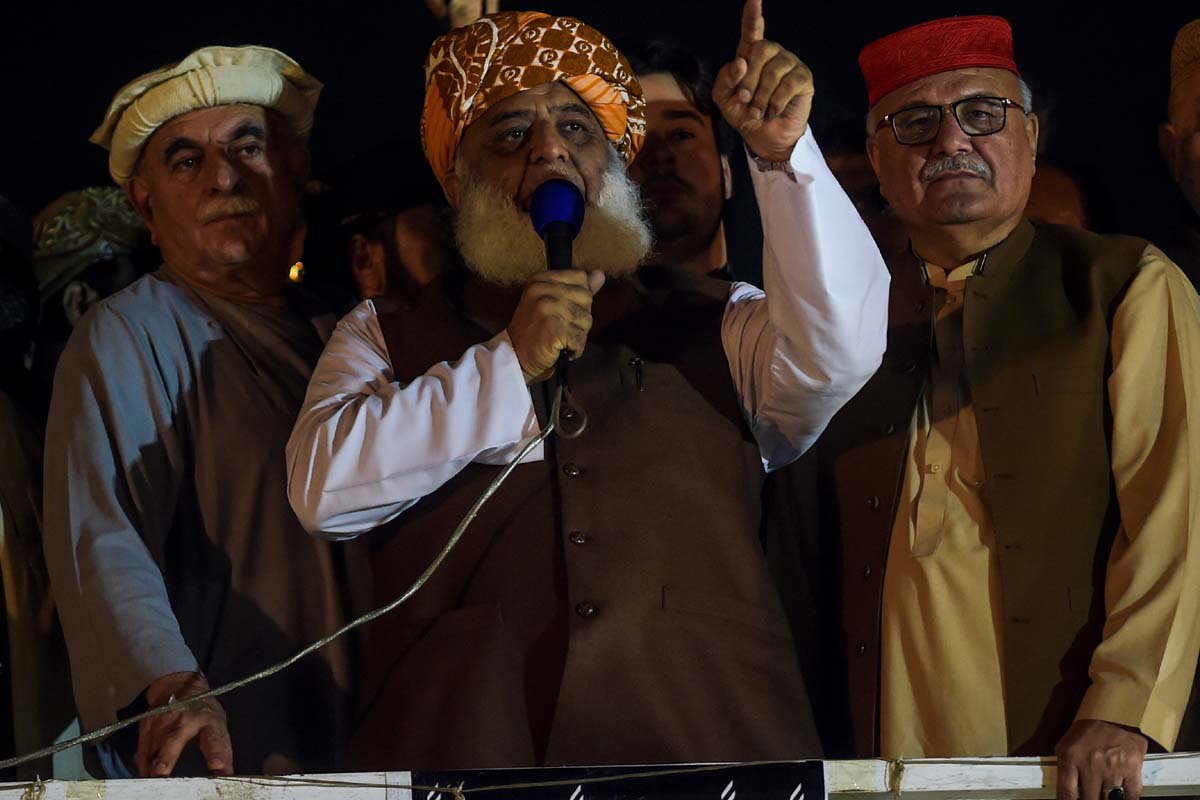Imran Khan shares mental health journey
Imran Khan discusses his ongoing mental health journey, emphasizing the importance of prioritizing wellness and seeking professional support.
The striking feature must be the consolidation of parties and politics in the Pakistan court though it is still rather uncertain whether the PPP leader, Bilawal Bhutto-Zardari, and the PML (N) chief, Shahbaz Sharif, will be able to attend, bogged down as they reportedly are with pressing engagements.

Leader of Awami National Party Mian Ifthikhar Hussain (R), and Chief of Pashtunkhwa Milli Awami Party Mahmood Khan Achakzai (L) look on as Islamic political party Jamiat Ulema-e-Islam (JUI-F) leader Maulana Fazlur Rehman (C) speaks during an anti-government "Azadi (Freedom) March" in Islamabad on November 2, 2019. Tens of thousands of Islamists rallied alongside opposition supporters in Pakistan's capital on November 1, as the firebrand cleric leading the protests called on Prime Minister Imran Khan's government to step down within 48 hours. (FAROOQ NAEEM / AFP)
There is mounting tension to the west of the Radcliffe Line. The two-day deadline to resign, served to Imran Khan by the hardline cleric, Maulana Fazlur Rehman, has lapsed even as the Azadi March winds its way through Pakistan. The ebullient Prime Minister remains entrenched in the saddle in Islamabad and with the tacit pre-election support of the Rawalpindi GHQ. Naya Pakistan, indeed his major campaign plank in 2018, is still rather delusory. In international relations, Mr Khan’s game theory has failed miserably ~ even at the United Nations and the International Court of Justice ~ to ratchet up the pressure on India over the Kashmir issue.
The economy has been stuttering amidst ballooning inflation. Altogether, the groundswell of disaffection is palpable in less than one and a half years since he assumed power. This time, the movement isn’t merely political. Spearheaded by the Maulana, there is a profoundly religious connotation to the upsurge as well. Dubbed as the “Gorbachov of Pakistan”, there is a resonant demand for Imran’s resignation. There are not many, even within the leadership of the ruling Pakistan Tehrik-i- Insaf, who will readily concur with his dealings visa- vis India, most particularly his orchestrated comments on a neighbour’s internal affairs, the cancellation of overflights , including the one carrying Narendra Modi to Saudi Arabia, and also, of course, his loudmouthed threat of a nuclear war.
It is quite obvious that such impetuous threats have scarcely impressed the domestic constituency. The leader of the Jamiat Ulema-e-Islam Fazl (JUI-F) has called an all-party meeting to discuss the course of action in consultation with the leaders of other Opposition parties. It is more than obvious that a concert of the Opposition is emerging to confront the Prime Minister. The Maulana has already garnered the support of a cross-section of parties, including parties that have ruled in the past, Nawaz Sharif’s Pakistan Muslim League (PML-N), Pakistan People’s Party (PPP), Pakhtunkhwa Milli Awami Party, Quami Watan Party, National Party, and the Awami National Party.
Advertisement
The striking feature must be the consolidation of parties and politics in the Pakistan court though it is still rather uncertain whether the PPP leader, Bilawal Bhutto-Zardari, and the PML (N) chief, Shahbaz Sharif, will be able to attend, bogged down as they reportedly are with pressing engagements. The excuse proffered by both is that the crucial meeting has been convened at short notice. It is open to question whether Imran Khan’s attempt to reach a halfway-house will attain fruition. His government has agreed to meet all demands of the Opposition, except the clamour for the Prime Minister’s resignation. The Opposition in Pakistan is far from a potent force. Aside from Mr Khan’s PTI, the other parties in the spectrum don’t really count. As long as he has the Army’s support, he will likely be a great survivor.
Advertisement